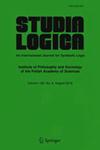A Simple Logic of the Hide and Seek Game
IF 0.6
3区 数学
Q2 LOGIC
引用次数: 3
Abstract
We discuss a simple logic to describe one of our favourite games from childhood, hide and seek, and show how a simple addition of an equality constant to describe the winning condition of the seeker makes our logic undecidable. There are certain decidable fragments of first-order logic which behave in a similar fashion with respect to such a language extension, and we add a new modal variant to that class. We discuss the relative expressive power of the proposed logic in comparison to the standard modal counterparts. We prove that the model checking problem for the resulting logic is $$\textsf{P}$$ -complete. In addition, by exploring the connection with related product logics, we gain more insight towards having a better understanding of the subtleties of the proposed framework.捉迷藏游戏的简单逻辑
我们讨论了一个简单的逻辑来描述我们从小最喜欢的游戏之一,捉迷藏,并展示了如何简单地添加一个相等常数来描述寻找者的获胜条件,使我们的逻辑不可判定。对于这样的语言扩展,有一些一阶逻辑的可确定片段以类似的方式表现,并且我们向该类添加了一个新的模态变体。我们讨论了与标准模态对应的逻辑相比,所提出的逻辑的相对表达能力。我们证明了结果逻辑的模型检验问题是$$\textsf{P}$$ -完整的。此外,通过探索与相关产品逻辑的联系,我们可以更深入地了解所提议框架的微妙之处。
本文章由计算机程序翻译,如有差异,请以英文原文为准。
求助全文
约1分钟内获得全文
求助全文
来源期刊

Studia Logica
MATHEMATICS-LOGIC
CiteScore
1.70
自引率
14.30%
发文量
43
审稿时长
6-12 weeks
期刊介绍:
The leading idea of Lvov-Warsaw School of Logic, Philosophy and Mathematics was to investigate philosophical problems by means of rigorous methods of mathematics. Evidence of the great success the School experienced is the fact that it has become generally recognized as Polish Style Logic. Today Polish Style Logic is no longer exclusively a Polish speciality. It is represented by numerous logicians, mathematicians and philosophers from research centers all over the world.
 求助内容:
求助内容: 应助结果提醒方式:
应助结果提醒方式:


